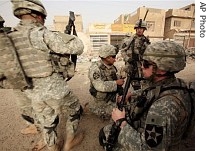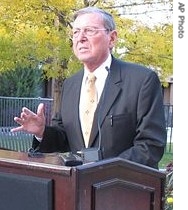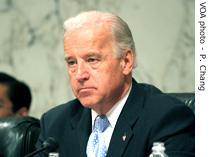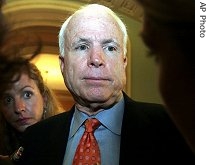-
(单词翻译:双击或拖选)
Washington
11 July 2007
President Bush is working to shore up support among fellow Republicans for the war in Iraq, even as opinion polls suggest that public backing for the war effort continues to erode1. VOA national correspondent Jim Malone has more from Washington.
 |
| US soldiers prepare to search homes in Baghdad, Iraq, 28 June 2007 |
The further erosion in public support for the war comes amid growing calls among Republicans for a change in course on Iraq, including some longtime supporters of the administration like New Mexico Senator Pete Domenici.
 |
| US Senator Pete Domenici talks to reporters, 7 Nov 2006 (file photo) |
Veteran Republican political strategist Ed Rollins says the growing Republican split on Iraq reflects the declining support for the war among the American public.
"I support the president on this war, I support the troops, obviously, who are still there," he said on NBC's Today show. "But at the end of the day, this is not going to work without public support, and the public support is eroding3 by the moment."
Analysts5 say the split over Iraq is also a reflection of the growing concern among some Republicans that they will be politically vulnerable in next year's elections unless they put some distance between themselves and President Bush.
John McIntyre is editor of realclearpolitics.com, a website that tracks U.S. politics and the 2008 presidential election.
"On the Republican side, I think you have a consensus6 forming among some that they kind of have a pessimistic view of where things are heading in Iraq," he said. "And so I think you see some Republican senators, particularly moderates, particularly Republican senators from blue [Democratic leaning] states who are up for re-election in 2008."
The divisions within the Republican ranks on Iraq come at a time when congressional Democrats7 are preparing to take more aggressive action to try and force the president to chart a different course in Iraq that will start bringing U.S. troops home.
 |
| Joseph Biden (Jan 2007 photo) |
"Do we continue to send our kids into the middle of a meat grinder based on a policy that is fundamentally flawed," he asked.
President Bush is trying to bolster8 Republican support for his Iraq policy. The president argues that lawmakers should withhold9 judgment10 until September when the top U.S. commanders in Iraq will report to Congress and the American people on the impact of the troop surge.
"They expect for military people to come back and tell us how the military operations are going," said Mr. Bush. "And that is the way I am going to play it as the commander in chief."
But analyst4 John McIntyre adds that some Republicans simply are not willing to wait that long.
"And the big battle is that the president would like to see the Congress have the patience to wait until September to hear on the progress from General Petraeus and whether the change in strategy is producing any results," he noted11. "But I think you are seeing some of these Republican senators feeling that because of their personal political interests, they do not want to wait until September. They want to get out in front of the situation now."
At the same time, few Republicans at this point seem willing to join Democrats in their efforts to force a timeline for U.S. troop withdrawals13 on the administration.
 |
| Sen. John McCain talks with reporters on Capitol Hill, 10 July 2007 |
"Mr. President, the terrorists are in this war to win it," he said. "The question is, are we?"
But McCain may be paying a political price for his staunch support on Iraq as he continues to lag behind in the race for the Republican Party's presidential nomination16.
Many experts say it is too early to tell what impact the Republican defections over Iraq will have on U.S. policy.
Duke University political scientist Christopher Gelpi predicts that the loss of Republican support will eventually force the president to make some adjustments in the deployment17 of U.S. forces in Iraq.
"What I think it most likely to happen is that the president will have to start making grudging18 concessions19 in order to avoid complete abandonment by Republicans, especially in the Senate," he said.
Iraq remains the central issue in the early stage of the 2008 presidential election campaign. The Democratic candidates generally favor some type of phased troop withdrawal12 from Iraq while most of the Republican contenders support the president's contention20 that Iraq is the central front in the overall war on terror.
 收听单词发音
收听单词发音
1
erode

|
|
| v.侵蚀,腐蚀,使...减少、减弱或消失 | |
参考例句: |
|
|
|
2
unwilling

|
|
| adj.不情愿的 | |
参考例句: |
|
|
|
3
eroding

|
|
| 侵蚀,腐蚀( erode的现在分词 ); 逐渐毁坏,削弱,损害 | |
参考例句: |
|
|
|
4
analyst

|
|
| n.分析家,化验员;心理分析学家 | |
参考例句: |
|
|
|
5
analysts

|
|
| 分析家,化验员( analyst的名词复数 ) | |
参考例句: |
|
|
|
6
consensus

|
|
| n.(意见等的)一致,一致同意,共识 | |
参考例句: |
|
|
|
7
democrats

|
|
| n.民主主义者,民主人士( democrat的名词复数 ) | |
参考例句: |
|
|
|
8
bolster

|
|
| n.枕垫;v.支持,鼓励 | |
参考例句: |
|
|
|
9
withhold

|
|
| v.拒绝,不给;使停止,阻挡 | |
参考例句: |
|
|
|
10
judgment

|
|
| n.审判;判断力,识别力,看法,意见 | |
参考例句: |
|
|
|
11
noted

|
|
| adj.著名的,知名的 | |
参考例句: |
|
|
|
12
withdrawal

|
|
| n.取回,提款;撤退,撤军;收回,撤销 | |
参考例句: |
|
|
|
13
withdrawals

|
|
| n.收回,取回,撤回( withdrawal的名词复数 );撤退,撤走;收回[取回,撤回,撤退,撤走]的实例;推出(组织),提走(存款),戒除毒瘾,对说过的话收回,孤僻 | |
参考例句: |
|
|
|
14
remains

|
|
| n.剩余物,残留物;遗体,遗迹 | |
参考例句: |
|
|
|
15
vocal

|
|
| adj.直言不讳的;嗓音的;n.[pl.]声乐节目 | |
参考例句: |
|
|
|
16
nomination

|
|
| n.提名,任命,提名权 | |
参考例句: |
|
|
|
17
deployment

|
|
| n. 部署,展开 | |
参考例句: |
|
|
|
18
grudging

|
|
| adj.勉强的,吝啬的 | |
参考例句: |
|
|
|
19
concessions

|
|
| n.(尤指由政府或雇主给予的)特许权( concession的名词复数 );承认;减价;(在某地的)特许经营权 | |
参考例句: |
|
|
|
20
contention

|
|
| n.争论,争辩,论战;论点,主张 | |
参考例句: |
|
|
|















